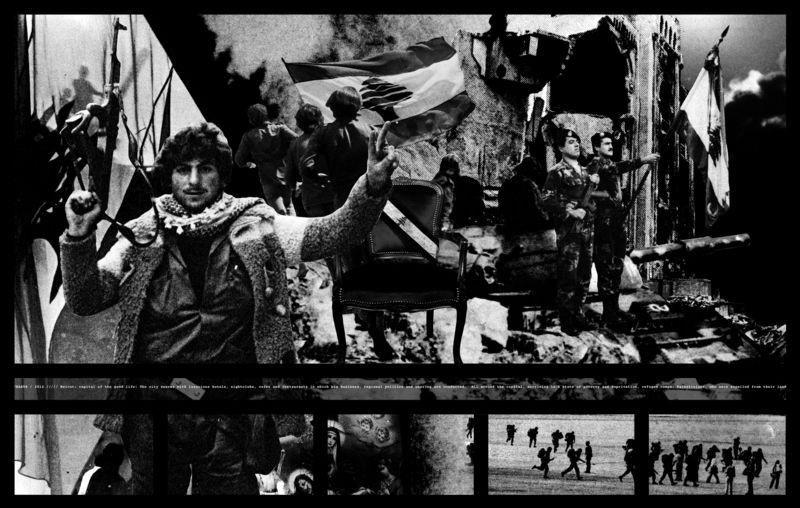Alfred Tarazi
30 Jan - 28 Feb 2015
ALFRED TARAZI
The Senseless Realm
Alistair Hicks, Senior Curator Deutsche Bank, will be speaking
30 January – 28 February 2015
Alfred Tarazi, who used to be Artist in Residence at the Krinzinger Projekte in 2011, is showing his first solo show at Galerie Krinzinger with the title THE SENSELESS REALM in the Galerie im Parterre.
The 19th century panorama, an early cinematic technique born out of historical painting, informs the artist's new works, constructed as continuous landscapes of assembled archival images from the Lebanese Civil War (1975-1990).
The five large moving panoramas in the exhibition allow the viewer to move frame by frame through the visual repertoire, recounting gruesome tales of the conflict. While these spurious stories are believed to be true, there are no extant visual accounts for them; therefore, the exhibition emerges as an approximation to historical reconstruction. The apocryphal narrative reconstruction of each story is performed through re-staged images of the war belonging to the same period. At the heart of this artistic intervention lies an epistemological question: What specific type of knowledge is acquired in the exercise of war? Might this knowledge be transmitted in the same distinct manner of Memory? In this archaeology of knowledge, excavating through thousands of harrowing images of destruction, desolation and horror, is there any claim to the authority of Truth? How could there otherwise be a transmission? As the sole vehicles of witnessing, are images only opinions or do they propose other modes and models of understanding?
When directing our gaze into the faces of these men and women in war, a happenstance realization occurs: War is a learning experience, but this forbidden knowledge seems to be acquired only in the manner of Kafka, "He found the Archimedean point, but he used it against himself; it seems that he was permitted to find it only under this condition." 1 Men at war are ultimately learning to kill, that is, seeking an escape from being, to go where both freedom and negation operate. This forbidden knowledge, comparable to the 'absolute' can be reached only dialectically, through negation and contradiction. But this knowledge is never gratuitous: The punishment for this knowledge, acquired through the senses, is the immediate corruption of the selfsame senses.
Entering this panorama of viscous and obtuse knowledge means accessing a permanent ruin, a world of atrophied senses and half-truths. Or, in the words of John Kelsey: "It is a postwar feeling of lost coordinates, a certain anonymous emptiness... It is both ruined and fresh."2
a text by Ari Akkermans and Alfred Tarazi
Alfred Tarazi born in the Lebanon in 1980, lives and works in Beirut.
1. Quoted in Hannah Arendt, The Human Condition (Chicago: The University of Chicago Press, 1958), p. 248
2. http://www.mutualart.com/OpenArticle/-theanyspacewhatever-/0D312D2C53A02AD5, 15th of January, 2015
The Senseless Realm
Alistair Hicks, Senior Curator Deutsche Bank, will be speaking
30 January – 28 February 2015
Alfred Tarazi, who used to be Artist in Residence at the Krinzinger Projekte in 2011, is showing his first solo show at Galerie Krinzinger with the title THE SENSELESS REALM in the Galerie im Parterre.
The 19th century panorama, an early cinematic technique born out of historical painting, informs the artist's new works, constructed as continuous landscapes of assembled archival images from the Lebanese Civil War (1975-1990).
The five large moving panoramas in the exhibition allow the viewer to move frame by frame through the visual repertoire, recounting gruesome tales of the conflict. While these spurious stories are believed to be true, there are no extant visual accounts for them; therefore, the exhibition emerges as an approximation to historical reconstruction. The apocryphal narrative reconstruction of each story is performed through re-staged images of the war belonging to the same period. At the heart of this artistic intervention lies an epistemological question: What specific type of knowledge is acquired in the exercise of war? Might this knowledge be transmitted in the same distinct manner of Memory? In this archaeology of knowledge, excavating through thousands of harrowing images of destruction, desolation and horror, is there any claim to the authority of Truth? How could there otherwise be a transmission? As the sole vehicles of witnessing, are images only opinions or do they propose other modes and models of understanding?
When directing our gaze into the faces of these men and women in war, a happenstance realization occurs: War is a learning experience, but this forbidden knowledge seems to be acquired only in the manner of Kafka, "He found the Archimedean point, but he used it against himself; it seems that he was permitted to find it only under this condition." 1 Men at war are ultimately learning to kill, that is, seeking an escape from being, to go where both freedom and negation operate. This forbidden knowledge, comparable to the 'absolute' can be reached only dialectically, through negation and contradiction. But this knowledge is never gratuitous: The punishment for this knowledge, acquired through the senses, is the immediate corruption of the selfsame senses.
Entering this panorama of viscous and obtuse knowledge means accessing a permanent ruin, a world of atrophied senses and half-truths. Or, in the words of John Kelsey: "It is a postwar feeling of lost coordinates, a certain anonymous emptiness... It is both ruined and fresh."2
a text by Ari Akkermans and Alfred Tarazi
Alfred Tarazi born in the Lebanon in 1980, lives and works in Beirut.
1. Quoted in Hannah Arendt, The Human Condition (Chicago: The University of Chicago Press, 1958), p. 248
2. http://www.mutualart.com/OpenArticle/-theanyspacewhatever-/0D312D2C53A02AD5, 15th of January, 2015

